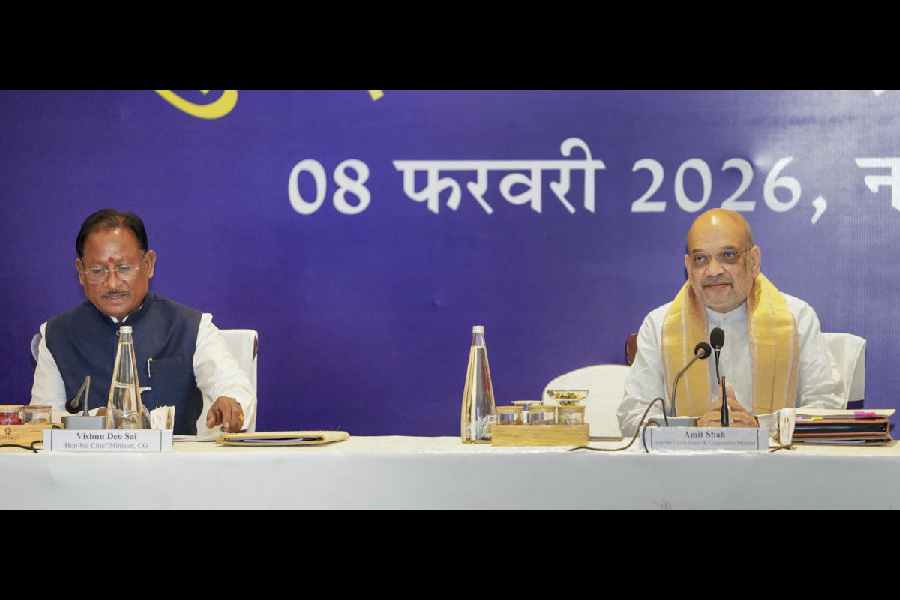 |
 |
| Young voters in Delhi. Pictures by Yasir Iqbal and Prem Singh |
April 10: At 42, Sreyas Yadav is twice as old as Sandeep Mehraulia. But both came of age today: they cast their first votes ever.
Ghaziabad IT professional Sreyas, like many of his upwardly mobile middle-class peers, had never before felt the urge to vote.
“But this time I made sure I had my voter I-card. For the first time in my life, I felt the time had come to be the change I wanted to see,” Sreyas said, drawing on a Mahatma Gandhi quote without a trace of self-consciousness.
The techie was among the first to queue up at his polling station with his wife this morning. So, what caused the change of heart?
“When you see so much corruption around you for so long, you become cynical. You begin to think that you don’t matter, that one vote doesn’t matter,” he said.
“But this time, I feel that my one vote could be the difference between a secular government and a government that will ruin the country.”
Sreyas isn’t the only habitual non-voter swept by a sudden urge to “make a difference”. But if ideology was the inspiration for many like him, the force of fashion cannot be underestimated, either.
Forty-year-old Monica Gupta, a director with an IT servicing company in Gurgaon who became a first-time voter today, feels it was the constant election buzz around her that made her sit up and take notice.
Parties and politicians campaigned on Facebook and Twitter and through text messages like never before, starting a chain reaction that made poll talk cool at office canteens and before water coolers.
The rise of the Aam Aadmi Party with its many “people like us” candidates too seems to have caught the eye of some among the “apolitical” middle class, criticised for lacking the public spirit to take an interest in things beyond their immediate environment.
“Today, I believe that I can be part of a change and not just sit in the drawing room and criticise politics and politicians. It was time to change the ‘Kya farak padta hai (Why bother)?’ attitude,” Monica said.
“I felt a glimmer of hope after a non-entity of a party won seats in the (Delhi) Assembly elections. I felt empowered. I felt the power of one vote, of having your say.”
She added: “After my finger was marked with ink, I felt an elation that I cannot describe. I think the media and social networking sites, where opinions were shared and discussed, gave a lot of people the impetus to go out and vote.”
Facebook had added a special feature just ahead of the polls to raise awareness on voting — an “I’m a Voter” button that not only was a constant reminder to vote but also let users mark their participation by clicking on it after voting.
Then there were the sops like the Federation of All India Petroleum Traders’ promised 50p discount per litre of petrol today to those with the indelible ink mark on their forefinger, private body Delhi Medical Association’s offer of up to a 50 per cent waiver on doctor fees; free public (even car rental) transport to the nearest polling stations; discounts on groceries at malls; and radio and TV exhortations.
“Add to this the 24x7 news channels…. This election is about instant connectivity. If you don’t vote, you automatically lose the right to express your opinions,” said Subhash Chauhan, 35, a sales executive from east Delhi.
It’s not just the middle class that felt the danger of social isolation and loss of face without the ink mark. So did Saifuddin, 50, a day labourer from Masuri village who had never voted before because he couldn’t afford to skip work and lose a day’s income.
“In every corner of our village there were nightly discussions about the elections this time. Also, for the first time, Muslims have a new party to talk about,” Saifuddin said.
“This kind of discussion never happened before. If I didn’t vote, I’d feel ashamed.”
So he gave work a miss today and voted.
Sandeep, 21, had had his first chance to vote in the December Assembly elections but passed it up. He joined his first poll queue early this morning.
“Even last night, I was caught up between two parties. Today, I made up my mind to vote for the likeliest candidate to become Prime Minister,” the Class IV employee at Safdarjung Hospital said.
“It was the mobilisation by the political parties that made the elections more interactive and helped me decide.”
Apart from the older citizens shedding their apathy and voting for the first time, each constituency will see an average of 90,000 new voters, between 18 and 22 years, become eligible, according to the latest data from the Election Commission.
This underlines the importance of the young voter — often seen as impatient and aspirational — to all the parties.
“The indifference about elections among youngsters has gone,” said Shrishti Pandey, 23, a media professional.
“My friends and I talk about local and national issues and the candidates’ credentials. There’s a definite change among the youth and an excitement about the electoral process.”
Delhi, Haryana and parts of Uttar Pradesh voted on April 10










